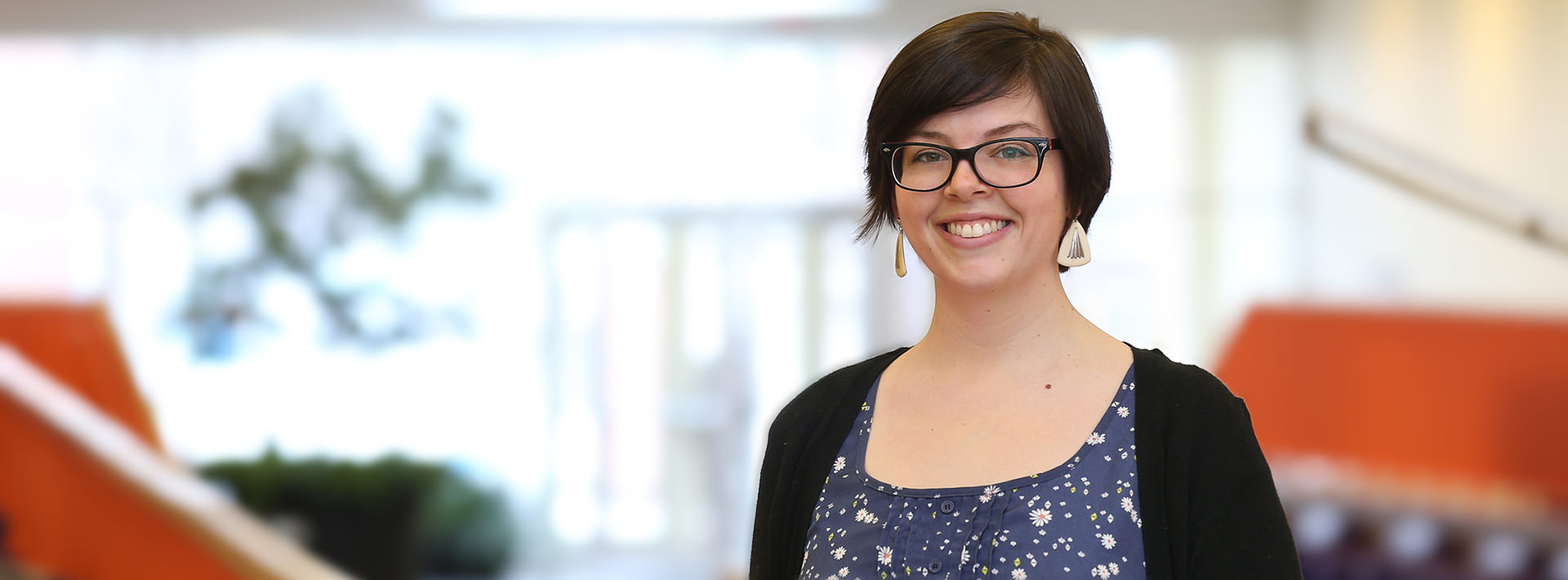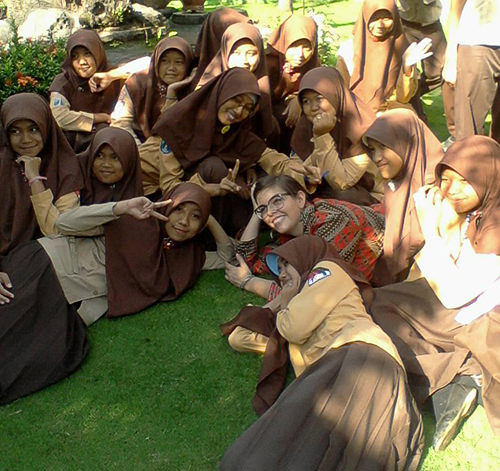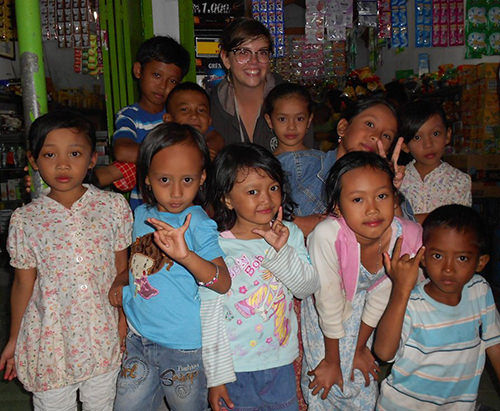Traditional healing in a modern world
Martin named Fulbright Student Scholar to Indonesia

By Bonnie Blankinship
As graduation speakers are fond of saying, the commencement ceremony does not represent an end, but a beginning. That is certainly true for Samantha Martin, an August graduate in the Cross-Cultural and International Education (MACIE) program at Bowling Green State University.
 Martin with some of her students at the Islamic High School of Panekan, in East Java, during her Peace Corps service.For Martin, commencement was the next steppingstone in her evolution as a scholar. She is preparing to return to Indonesia in early September, this time as a Fulbright Student Scholar. She served in the island nation as a Peace Corps volunteer in 2010-12. Backing her at BGSU has been a campus-wide support team of faculty and staff.
Martin with some of her students at the Islamic High School of Panekan, in East Java, during her Peace Corps service.For Martin, commencement was the next steppingstone in her evolution as a scholar. She is preparing to return to Indonesia in early September, this time as a Fulbright Student Scholar. She served in the island nation as a Peace Corps volunteer in 2010-12. Backing her at BGSU has been a campus-wide support team of faculty and staff.
Martin will conduct a case study of traditional healing practices on Java, the most populous of the thousands of islands that make up Indonesia.
“I have been approved for my research permit from the Indonesian government and am now waiting for my visa to be processed,” she reported. “I have been doing some preliminary research. I received some great help from Dr. Jeremy Wallach and Dr. Esther Clinton in the popular culture studies department at BGSU, who directed me to some great materials and books on Indonesian culture and history. They both have experience in Indonesia, and Dr. Wallach in particular has done quite a bit of research there himself.
“I've also been starting to connect with the existing Peace Corps network in Java, and hopefully those connections will help me learn about communities that may be interested in hosting me and participating in the research project.”
Student Fulbright grants are very selective; this year there were only 12 research grants and about 30 English-teaching assistantships given. The application process is difficult. Martin said she’s grateful for the support she received from BGSU’s International Student Services.
“They were wonderful. They helped me refine my proposal and tailor it. Having their advice and experience was invaluable.”
 Martin with neighborhood children who studied English with her after school most days.Martin said she also received important advice and assistance from Dr. Nancy Patterson in the School of Teaching and Learning, who had been a Fulbright scholar, and MACIE director Dr. Christopher Frey, who had also worked with the Navajo people, as Martin did in her undergraduate program. “We shared the same experience, around 10 years apart,” Martin said.
Martin with neighborhood children who studied English with her after school most days.Martin said she also received important advice and assistance from Dr. Nancy Patterson in the School of Teaching and Learning, who had been a Fulbright scholar, and MACIE director Dr. Christopher Frey, who had also worked with the Navajo people, as Martin did in her undergraduate program. “We shared the same experience, around 10 years apart,” Martin said.
Patterson, who has worked with Martin on two grant submissions related to Indonesia, said, “Sam is a singular person who is the perfect mix of compassion and initiative. Whenever I work with her, I learn about myself, which is the sign of a true teacher and humanitarian. Most impressive is her command of Bahasa Indonesia, which I have seen her use with fluency and grace on our Skype calls with her good friends at Universitas Muhammadiyah Malang. Sam Martin will continue to elevate BGSU’s reputation in Indonesia, and I relish hearing about her work in years to come.”
Indonesia is the fourth most populous country in the world, and an important trading partner. Yet, like most U.S. citizens, Martin knew almost nothing of the country until she served there with the Peace Corps. She was part of the first cohort to serve there since 1964 following President Barack Obama’s 2009 re-opening of relations with Indonesia.
The complex culture of the island nation resonated with Martin.
After having personally experienced traditional healing practices both while on Java in the Peace Corps and while she was a student teacher in the Navajo Nation as an undergraduate at Indiana University at Bloomington, Martin became interested in how a person in today’s world becomes a traditional healer, and what their status is in their community. And, in the case of Java, how contemporary Indonesian Islam overlaps with secular Javanese healing arts, and how traditional practices have evolved.
“In rural areas, people may identify as Muslim, but the elements of traditional culture may be a little stronger,” Martin said. “I’d like to know which traditional cultural practices are still being held onto and why. And whether young people are still becoming healers and what their path is toward that.”
“I want to be contributing something, not just taking information from them and leaving”Martin’s master’s thesis is a case study of women healers in south-central Indiana. “The possibilities for a comparative project on healers’ experiences in the U.S. and Indonesia are exciting to me,” she said.
In addition to her research, Martin also will do volunteer teaching in local schools during her Fulbright stay. “I want to be contributing something, not just taking information from them and leaving,” she said. “I like teaching and working with kids.”
Indonesia is a rich mix of all the influences over the centuries from the various traders who came through, bringing with them their religions and cultures. Among them have been Arab, Indian and Chinese traders, Buddhists and Hindus, and 300-plus years of Dutch colonialism. Two typical dishes, meatballs and fried rice, reflect the multicultural background of the country.
“It’s been 65 years since independence from the Dutch and now there are burgeoning markets and a lot of money there, although there are huge income gaps,” Martin said. “The country is also very wealthy in natural resources. Technology is booming, and they’ve effectively skipped over landlines and now everyone communicates by cellphones. They access the Internet daily from their smartphones. Indonesia is quickly becoming globalized and more prominent on the international scene.”
Martin will be based during her 10-month sojourn at her host university, the Universitas Muhammadiyah Malang, and will travel to rural communities to interview from eight to 15 traditional healers and their clients in depth. She expects to draw on her connections in several areas and then, through them, meet others, staying with local families at times.
Getting around on Java is not nearly the challenge it can be in some countries, Martin said. “Java is the most densely populated island in the world and there’s so much public transportation that it’s easy. It’s not the two-hour bike ride to even see anyone that is often associated with Peace Corps service.”
Reflecting on her life so far, she said, “I never thought when I entered the Peace Corps and was assigned to a nation I knew nothing about that Southeast Asian Studies would turn out to be so interesting to me. But MACIE helped give me some direction, and helped me develop my thesis project. That’s what’s so special about MACIE: you have a group of really neat people with such diverse experiences and it’s still small enough to be very intimate.”
Before learning she’d been accepted into the Fulbright program, Martin was accepted by several U.S. universities’ doctoral programs. Her Fulbright experience on Java is sure to enrich and inform her future educational and professional choices.
Updated: 12/02/2017 12:51AM
